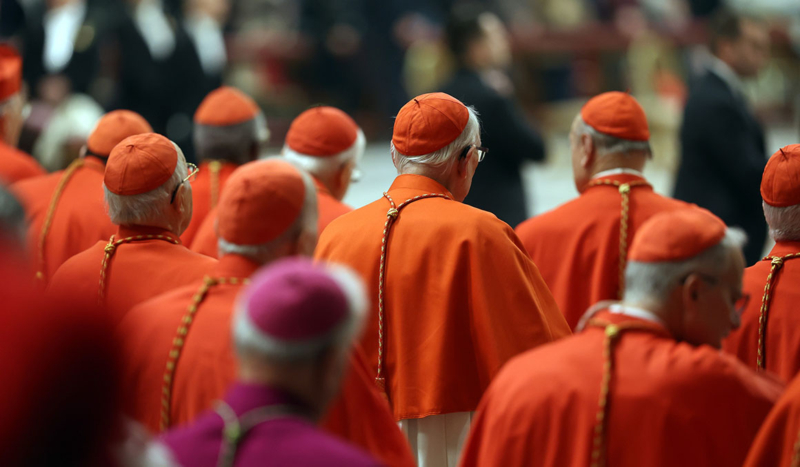
Marco Iacobucci Epp / Shutterstock.com
VATICAN CITY // Abbot Donato Ogliari O.S.B., the Benedictine abbot of Saint Paul Outside the Walls, delivered a long meditation April 29 to the cardinals gathered in General Congregation at the Vatican, calling for a “courageous church” and pointing to some of the challenges it confronts.
Abbot Ogliari opened by meditating on the Gospel for the feast of St. Catherine of Siena, emphasizing the centrality of Christ in the life and mission of the Church. He reminded the cardinals that, especially in a moment “so laden with consequences for the Church — as is the choice of the Bishop of Rome and Pastor of the universal Church — the words of Jesus: ‘Come to me, all of you,’ to which Peter’s rhetorical question echoes: ‘Lord, to whom shall we go?’, resound as a pressing invitation to recompose every movement of your soul, mind, heart, and life around the person of Jesus and the joyful light of His Gospel.”
He warned that without Christ at the center, the Church “would be nothing but a cold and sterile institution, lacking that sacred fire which burns, warms, and illuminates, and which comes to her from her Lord!” He urged the Cardinals to “let Christ, therefore, be the guiding star and at the same time the compass for your expectations, your meetings, your dialogues, and the choices you will be called to make.”
Learning from Christ
Drawing from Jesus’ words in Matthew 11:29, Ogliari stressed the importance of meekness and humility, qualities that do not come naturally to human beings but are essential for the Church’s witness.
“Since the Church is called to show the world the face of her Lord, she must daily allow herself to be evangelized in order to learn ever more and ever better what it means to be in the world the meek, humble, and compassionate face of Jesus,” he added.
A church rooted in Christ
Ogliari described the Church “rooted in Christ” as:
- “An open, courageous, and prophetic Church, which abhors violent words and gestures, knows how to be the voice of those who have no voice, and, if necessary, knows how to be a voice out of the chorus if only to steadfastly indicate the paths of justice, fraternity, and peace.”
- “A mother Church, not a stepmother, who knows how to care for and nourish her sons and daughters, anchoring them to the hope that does not disappoint, the love of God poured into our hearts.”
Later, reflecting on Jesus’ encounter with Nicodemus (John 3:8), Abbot Ogliari spoke of the unpredictable and renewing work of the Holy Spirit: “The wind blows where it wills, and you hear its sound, but you do not know where it comes from or where it goes; so it is with everyone who is born of the Spirit.”
He called the Cardinals to openness and conversion: “It is up to us, that is, to make ourselves vulnerable to the promptings of the Spirit and to review or heal, in His light, our evaluative criteria, to avoid instrumentalizing the signs of God and interpreting them by bending them to our preconceptions.”
Abbot Ogliari invited the Cardinals to see the “upper room” of Jerusalem, where the disciples gathered, as a model for their own assembly: “In the ‘upper room,’ the nascent Church discovers herself as a community gathered around Christ … Above all, it appears that the communion which the Holy Spirit builds in the community of believers is not the fruit of a flat and rigid uniformity … the unity and communion that the Church is called to live are a plural unity and a diversified communion.”
Contemporary challenges
Abbot Ogliari did not shy away from naming the challenges facing the Church, both external and internal:
- Anthropological changes and ethical dilemmas
- Wars, nationalism, and the rise of autocracies
- The impact of technology and artificial intelligence
- Migration and secularization
- Decline in vocations and the need for new pastoral approaches
He urged the Church to respond with “sound discernment” and to pursue dialogue “without fear,” reminding the cardinals of the “immense good that the Church accomplishes at every latitude,” and the courage of those who suffer for their faith.
Drawing on the image of the potter from Jeremiah, Abbot Ogliari encouraged patience and resilience: “Returning to ourselves and the journey of the Church … embracing patience is what allows us to persevere, not to lose heart, and not to give up in the face of failures and setbacks … a Church that knows how to be patient is a Church that knows how to hope.”
Abbot Ogliari concluded by inviting the cardinals to see the Sistine Chapel as a new “upper room,” open to the Spirit: “Even if the place of the ‘conclave’ — as the term itself says — is a place closed with a key, it will actually be open to the whole world, if the freedom of the Spirit prevails, who, when He touches hearts and minds, rejuvenates, purifies, recreates … Therefore, let the light of the Spirit encounter your freedom; let it enter into dialogue with you, with your inner world and — through you — with that varied and universal world of which you are the expression … let it truly be He, the Holy Spirit, the principal protagonist, let Him shape your hearts, ignite your minds, and illuminate your eyes so that you may feel, understand, and see the wonders that the Lord is about to accomplish for the good of His Church and of the whole world!”

